In today’s edition of Daily Compliance News:
· Trevor Bauer suspended for rest of season. (ESPN)
· Biden Administration weighing China trade probe. (Bloomberg)
· Is Google violating temp worker pay? (NYT)
· Faulty USPS metrics? (WaPo)
Tag: 9/11
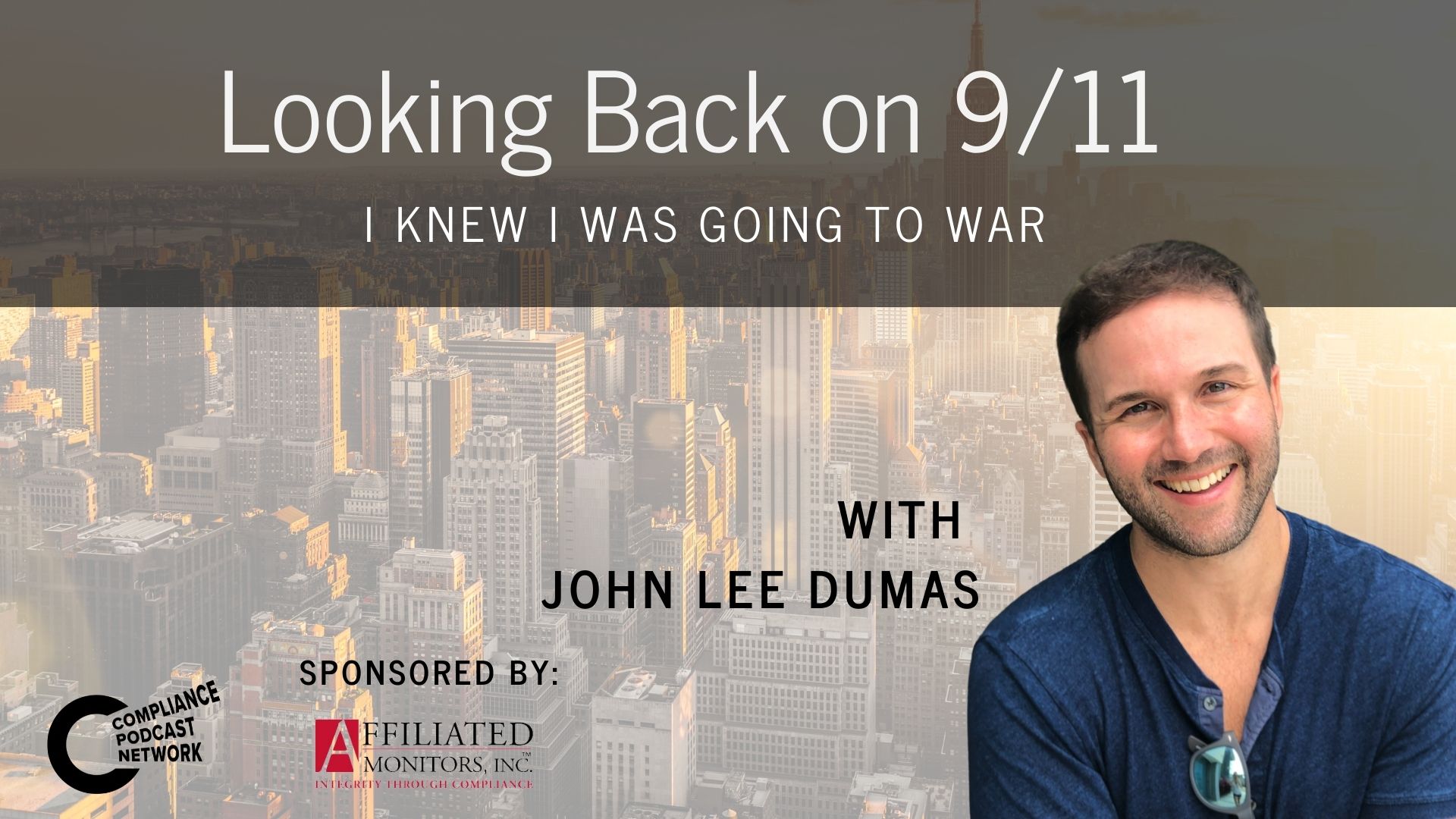
John Lee Dumas, host of the award-winning podcast Entrepreneurs on Fire, joins Tom Fox on the last installment of Looking Back at 9/11 to commemorate the 20th anniversary of the 9/11 attack. He tells Tom how his life changed in that pivotal moment, and the big lessons he learned.
A Time of War
John tells Tom that he was in his final year at Providence College, and in the ROTC cadets, on 9/11. When he saw the towers fall, he knew at once that it would change the trajectory of his career. He and his roommate looked at each other and they knew “that our next four years of active duty army experience went from being in the peacetime army to looking like we were going to war.” Within hours they were called to active duty: “We just became officers in the US army during a time of war,” John recalls.
Leadership Lessons from the Army
Tom asks John what leadership lessons he learned from his time in the army. John outlines three major takeaways that his time in combat taught him:
- To learn from those who went before. “I learned right at the beginning, I needed to stand upon the shoulders of giants,” he remarks.
- A good decision now is better than a great decision later. Action is everything. Make the best decision you can with the information you have, take action, then adjust if you need to when you know more.
- If you discover later on that you made a wrong decision, cut your losses and move on. Don’t compound that mistake by staying in a bad place, John advises. “I kept being willing to pull back and say let’s try again, until I finally made a great decision. It took six years to make my first great decision, but that great decision has led to the last 10 years of living the exact life that I want to live.”
What Americans Should Remember
John wants Americans to appreciate their freedom, because it was hard won. He tells listeners, “So few people have ever experienced what true lawlessness is. And until you’ve experienced that, it’s hard to really appreciate what we do have here. But you know, this is a great country and it is the home of the free because of the brave. And I hope that’s just something that we will always remember.”
Resources
John Lee Dumas: Entrepreneurs on Fire | Twitter
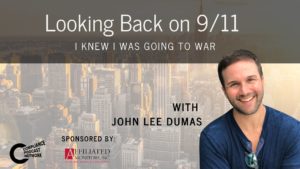 Today is the 20th anniversary of the attacks upon America on September 11, 2001. Like most Americans, this was the seminal event in the history of our country. I have been thinking a lot about that date and the anniversary; even more so with the fall of Afghanistan and the evacuation from Kabul. I wanted to do something to commemorate this anniversary, so I decided to do a podcast series featuring the personal stories of persons in the compliance field with their thoughts about what the date of 9/11 means to them, how it changed our profession and their thoughts looking back some 20 years later. The lineup for this week has been:
Today is the 20th anniversary of the attacks upon America on September 11, 2001. Like most Americans, this was the seminal event in the history of our country. I have been thinking a lot about that date and the anniversary; even more so with the fall of Afghanistan and the evacuation from Kabul. I wanted to do something to commemorate this anniversary, so I decided to do a podcast series featuring the personal stories of persons in the compliance field with their thoughts about what the date of 9/11 means to them, how it changed our profession and their thoughts looking back some 20 years later. The lineup for this week has been:
- 6 – Gabe Hidalgo
- 7 – Juan Zarate
- 8 – Alex Dill
- 9 – Eric Feldman
- 10 – Scott Moritz
- 11 – John Lee Dumas
I conclude this series by visiting with John Lee Dumas, host of the uber popular podcast Entrepreneur on Fire. On 9/11 Dumas was a college senior at Providence College. John had one of the most powerful stories I have ever heard around the events of 9/11.
Dumas was also an Officer Candidate in ROTC on 9/11. He said, “I remember I woke up in the morning and one of my roommates said, “Hey, turn the TV on”. We turned on the TV and we just saw the tower smoking. Very shortly after that the collapsing live on the television screen. One of my roommates who was also in ROTC, we looked at each other and we both knew without saying anything that our next four years of active-duty army experience went from being in the peacetime army to looking like we were going to war of some kind. We knew when that tower collapsed that we were going to be playing a very active roles as officers in the US Army. Within a couple hours, we actually had a real world briefing at our ROTC headquarters on campus where the commander of our ROTC battalion, gave us a real-world breakdown. It confirmed what we were thinking when we saw that the tower collapse. We just became officers in the US Army during a time of war.”
We turned to leadership lessons Dumas learned from his time in the Army. He commanded a tank platoon, which was four M1 Abrams tanks and 16 men. Yet, as the tank commander, Dumas was one of the least knowledgeable persons within his own platoon about how a tank worked, the best operations, how to drive a tank, how to load the Sable rounds, how to actually fire the weapon and even how to navigate. He related, “I was the platoon leader at 22 years old and one of the least experienced and least knowledgeable people in my platoon. That’s how the military works. And I learned right at the beginning, I needed to stand upon the shoulders of giants. I needed to go to my Platoon Sergeant, at the time, who seemed like an old man at 37 years old. But it was me, like a little baby.”
Dumas went to Sergeant Walker with humility and humbleness and asked him, “what do I need to know? How can you respectfully in front of the men? How can you respectfully be my mentor?” He really appreciated the fact that “I was not trying to pretend like I knew what I didn’t know and going to him for advice. That was a big lesson. And I’m standing upon the shoulders of giants and learning from those who have been there, done that with experience.””
Another key leadership lesson for Dumas was that “a good decision now is better than a great decision later.” He said that he has seen a lot of people in the entrepreneurship and business world paralyzed, trying to make a great decision. “They are trying to be like General Patton, trying to make the one decision that’s going to win the war.” The problem is that if you “try to wait around and wait while the bullets were flying to make a great decision, you and probably other people are going to die because time is everything. Action is everything. Just coming up with a good decision and implementing it right now, that’s going to be the fraction, that separates life and death for a lot of people, I learned that firsthand and that is something that will always stay with me. I took that lesson from the military and applied it to entrepreneurship. I’m not going to sit around and try to make a great decision on this aspect of my podcast, on that aspect of my business, on this aspect of this, I’m just going to make a good decision take action. And if I need to adjust later, I will.”
We talked about losing men in combat. Dumas said he learned at age 22 and 23, the finality of death. He said, “somebody you had breakfast with that morning, they were talking about their hopes, their dreams, their aspirations, what they were going to do when they got back that evening, what they’re going to do when they get back home from combat. And then all of a sudden it’s over. None of that is going to happen. None of their hopes, none of their dreams will ever be realized. There’s just such a finality to it. It made me pledge to myself to never forget number one, of course, the sacrifice that these soldiers make, but never forget to just the finality of death and how we can all have the best of intentions.”
He learned that if you “don’t take action on them, death can wipe those best intentions away and you can be left essentially having never done or accomplished anything that you set out to do in this life so quickly. This put a ticking time bomb mentality in my mind of if I don’t feel like this is the right path for me, I’m not going to waste any more time, fussing around having the sunk cost fallacy.” This led him to his current profession which he loves.
I concluded by asking Dumas about his reflections of 9/11 and of going to war in Iraq some 20 years later. He said, “My reflections on 9/11 was just travesty terror, confusion, panic, nobody really knowing what was coming next. The major message that I do want to pass across for people today is something that was really obvious to me living in Iraq for 13 months and living in a world where there really was no police. There really was no law. There really was no cohesion. There was no repercussions. This is a great country, and it is the home of the free because of the brave. And I hope that’s just something that we will always remember.”
I wanted to thank all those who participated in this series. I brought up a lot of emotions for everyone but has John said it is something we all need to talk about. I hope you will take a moment on this most solemn day to reflect on 20 years after 9/11.
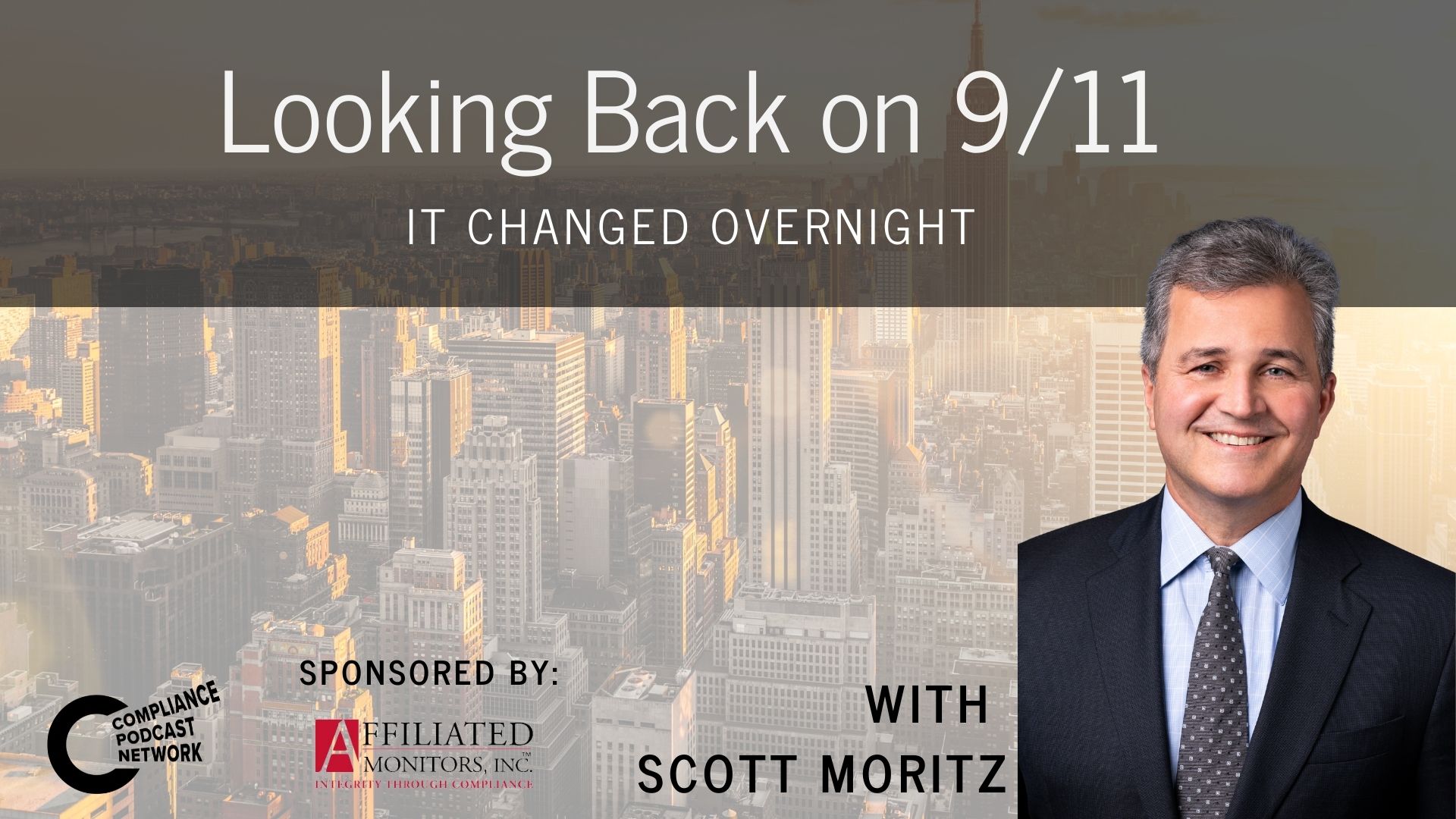
Scott Moritz is Tom Fox’s guest on this episode of Looking Back at 9/11. Scott is the Senior Managing Director at FTI Consulting Risk and Investigations, assisting clients and their outside counsel in managing their response to white collar crime, misconduct and bribery incidents. He is also the host of the podcast series, Fraud Eats Strategy. Scott joins Tom to talk about how the events of 9/11 impacted the FBI.
How 9/11 Changed The FBI: Structural and Cultural Ambidexterity
9/11 fundamentally changed the FBI overnight. Scott remarks that for a long time after 9/11, the FBI was primarily focused on the attack on the Trade Center. That was the Bureau’s main investigation, and it was being worked on by all the FBI field offices, and virtually every foreign attache office in the world. Many scholars, through various organizational studies and surveys, assumed that the FBI would have created simultaneous frontline structures and processes to balance their two competing missions: national security and law enforcement. The scholars also posited that perhaps the FBI would engage in cultural ambidexterity, which would be to refuse to take on the mission of national security altogether. The FBI did something altogether unexpected and tackled both.
The Benefit of One Agency
“There was this rapid emergence of two clear, but distinct, identities, and eventually, you know, one new unified identity FBI, but some changes where, terrorism cases were centralized at headquarters…This was a big departure from the way that the FBI normally operated,” Scott tells Tom. By staying as a single agency, the FBI had better access to local law enforcement agencies and could take better advantage of defendants with information that could advance the national security mission.
A Shift In The Private Sector
Tom asks Scott to talk about any changes in the private sector he was personally involved in. The major change in the private sector post-9/11, especially with respect to financial institutions, was the induction of the Patriot Act which also paved the way for other significant changes. Financial Institutions and broker dealers had to harden the security of buildings and supply chains across the country’s infrastructure. There was also the explosion of no fly lists, watch lists and terrorist watch lists. Banks, building owners and brokerage companies had to navigate these systems often, and quickly. Scott was very involved in helping these institutions in their anti money laundering obligations, as well as their security obligations.
Looking To The Future
Tom asks Scott to share some reflections on 9/11, and for the future. Scott remarks that post-9/11, the country was more united and people were more compassionate to one another. The best of humanity in forms of kindness and outpouring of love was seen not just from Americans to each other, but from the rest of the world to America. He hopes that someday he can see that kind of love and unity again.
Resources
Scott Moritz | LinkedIn | Twitter
Fraud Eats Strategy
This week is the 20th anniversary of 9/11. On Saturday Tom and Jay ask that you take a moment of silence to remember all those who lost their lives on that day, their loved ones and those who were impacted by those events over the past 20 years.
Stories
1. Elizabeth Holmes finally goes to trial. Aly McDevitt in Compliance Week (sub req’d) Opening statements review in the WSJ.
2. The role of compliance in an ESG effort. David Povey in Compliance Week. (sub req’d) Matt Kelly weighs in on diversity as well in Navex Global’s Risk and Compliance Matters.
3. Raytheon under FCPA scrutiny. Dylan Tokar in WSJ Risk and Compliance Journal.
4. CCI surveying stress in compliance. Henry Kronk in CCI. Take the survey here.
5. From Wells Fargo to Kraft Foods. Matt Kelly in Radical Compliance. Tom and Matt in Compliance into the Weeds.
6. Has the SFO turned the corner? Martin Kenney in the FCPA Blog.
7. Measuring compliance measurement. Jeff Kaplan in COI Blog.
8. From firm specific risk to systemic risk. John Coffee in Harvard Law School Forum on Corporate Governance
9. Do you need a BOD Code of Conduct? Kristy Grant-Hart in Compliance Kristy.
10. Joe Biden-the anti-corruption President? Joe Acotoia in Corruption Crime and Compliance.
Podcasts and Events
11. On Everything Compliance, the full gang discuss where they were on 9/11 and its impact on their profession. Lisa Fine looks back on 9/11 in Great Women in Compliance.
12. On Innovation in Compliance, Tom has run a 6-part special podcast series on Looking Back on 9/11, sponsored by Affiliated Monitors. In this series he will visit with professionals from a variety of compliance perspectives who will discuss how 9/11 changed our profession, including three who were in NYC during the attacks. Hear thoughts and reflections from Gabe Hidalgo, Juan Zarate, Alex Dill, Eric Feldman, Scott Moritz and John Lee Dumas.
13. Join K2 Integrity September 15 for a round-table on the 20th Anniversary of September 11 and consider its impact on countering terrorist financing and illicit financing, and the continuing risks to national security. The roundtable will include members of the team that spearheaded the post-9/11 counter illicit finance regime: Juan Zarate, Chip Poncy, Danny McGlynn, moderated by Dr. Michele L. Malvesti. Information and Registration here.
14. Ethisphere’s World Most Ethical Company awards for 2022 are open for submission. For more information on the Application Process, click here.
15. Breaking News features The Compliance Handbook, 2nd edition. Check out the Breaking News feature here. Purchase The Compliance Handbook, 2nd edition here.
Tom Fox is the Voice of Compliance and can be reached at tfox@tfoxlaw.com. Co-host Jay Rosen (AKA ‘Mr. Monitor’) can be reached at jrosen@affiliatedmonitors.com.
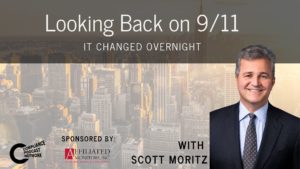 This coming Saturday is the 20th anniversary of the attacks upon America on September 11, 2001. Like most Americans, this was the seminal event in the history of our country. I have been thinking a lot about that date and the anniversary; even more so with the fall of Afghanistan and the evacuation from Kabul. I wanted to do something to commemorate this anniversary, so I decided to do a podcast series featuring the personal stories of persons in the compliance field with their thoughts about what the date of 9/11 means to them, how it changed our profession and their thoughts looking back some 20 years later. The lineup for this week is:
This coming Saturday is the 20th anniversary of the attacks upon America on September 11, 2001. Like most Americans, this was the seminal event in the history of our country. I have been thinking a lot about that date and the anniversary; even more so with the fall of Afghanistan and the evacuation from Kabul. I wanted to do something to commemorate this anniversary, so I decided to do a podcast series featuring the personal stories of persons in the compliance field with their thoughts about what the date of 9/11 means to them, how it changed our profession and their thoughts looking back some 20 years later. The lineup for this week is:
- 6 – Gabe Hidalgo
- 7 – Juan Zarate
- 8 – Alex Dill
- 9 – Eric Feldman
- 10 – Scott Moritz
- 11 – John Lee Dumas
I visited with Scott Moritz for my podcast series Looking Back at 9/11. Scott is now a Senior Managing Director at FTI Consulting, Inc. in their in the Global Risk & Investigations practice. On 9/11 Scott was working in midtown Manhattan. He joined me to talk about how the events of 9/11 impacted the FBI.
9/11 fundamentally changed the FBI overnight. He has some very poignant and moving recollections from that day, from realizing that many of the senior team were in the air that morning, to seeing streams of panicked New Yorkers running down the streets of Manhattan, to his journey home that night. He related how he and some colleagues were walking to Penn Station to catch a train home and as they crossed 5th Avenue, which had a view into lower Manhattan where the World Trade Center, Twin Towers had stood. As they looked down the street, they could no longer see those symbols of America’s financial center.
Scott remarked that for a long time after 9/11, the FBI was primarily focused on the attacks on the World Trade Center. That was the Bureau’s main investigation, and it was being worked on by all the FBI field offices, and virtually every foreign attaché office in the world. He discussed a Harvard Business School study which reviewed the changes made by the FBI in the wake of 9/11. Many scholars, through various organizational studies and surveys, assumed that the FBI would have created simultaneous frontline structures and processes to balance their two competing missions: national security and law enforcement. The scholars also posited that perhaps the FBI would engage in cultural ambidexterity, which would be to refuse to take on the mission of national security altogether. The FBI did something altogether unexpected and tackled both.
Moritz said, “There was this rapid emergence of two clear, but distinct, identities, and eventually, you know, one new unified identity FBI, but some changes were, terrorism cases, were centralized at headquarters… This was a big departure from the way that the FBI normally operated,”
Scott reflected that by staying as a single agency with a dual mission, one of the benefits to the FBI and to the law enforcement mission in general was the FBI had better access to local law enforcement agencies and could take better advantage of cooperating defendants who may have information that could advance the national security mission. He said, “I think that’s proven to be a really effective model. The FBI has significantly improved threat analysis following the creation of the national director of intelligence, the field intelligence group, and probably most notably the addition of embedded security analysts in each of the 56 FBI field offices.” Moreover, the most important part of the FBI’s transformation is how those intelligence analyses were effectively integrated into FBI operations. Finally, he concluded, “the FBI no longer describes itself as a law enforcement agency, although that is clearly part of the mission. Now there is a dual mission with the FBI describing itself.”
I asked Scott to reflect on changes in the private sector in which he was involved. The major change in the private sector post-9/11, especially with respect to financial institutions, was the induction of the Patriot Act which also paved the way for other significant changes. Financial Institutions and broker dealers had to harden the security of buildings and supply chains across the country’s infrastructure. There was also the explosion of no-fly lists, watch lists and terrorist watch lists. Banks, building owners and brokerage companies had to navigate these systems often, and quickly. Scott was very involved in helping these institutions in their anti-money laundering (AML) obligations, as well as their security obligations.
I asked Scott to share some reflections on 9/11, and for the future. He remarked that post-9/11, the country was more united, and people were more compassionate to one another. He spoke about “the tender mercies of strangers who were consoling one another, in the days that followed. My wife was in the grocery store and another customer was just overcome with grief, going through like this mundane task of getting groceries and a complete stranger just came up to her, hugged her and consoled her, and that was playing out all over the place. It was phenomenal, the best of human nature that really was tapped into. I also remember the outpouring of love and compassion to the American people from every part of the world. Finally, as a New Yorker, I experienced some of that outpouring firsthand.”
Moritz concluded, “I hope that we can summon some of that compassion and human kindness that followed 9/11 to heal what’s going on in our today”
Please check out this week’s podcasts on the Compliance Podcast Network, JDSupra, Innovation in Compliance, YouTube, iTunes and Spotify. Tomorrow John Lee Dumas will join me to discuss how as a college senior in ROTC on 9/11, he knew from that day forward he was going to war.
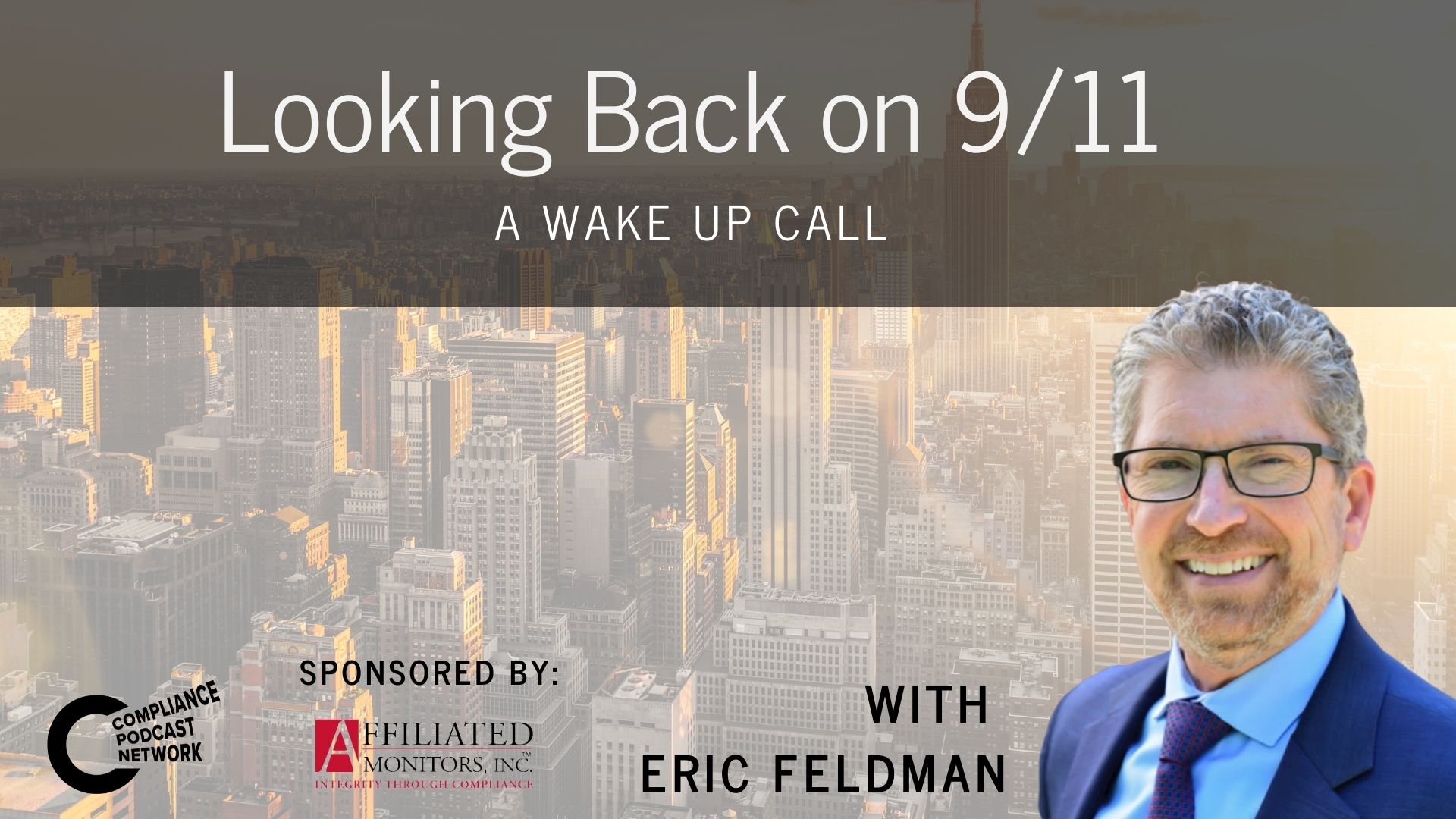
Eric Feldman is Tom Fox’s guest on this episode of Looking Back at 9/11. Eric is the Senior Vice President and Managing Director at Affiliated Monitors, a company that deals with monitoring large and small companies in the government contracting, construction, engineering, manufacturing, and financial services. He also conducts assessments of corporate ethics and compliance programs across many countries. Eric joins Tom to talk about the impact the events of 9/11 had on the role of Inspector General.
The Impact of 9/11 on The IG’s Role
Eric explains to Tom that 9/11 was the most informative time of his career, and the careers of many other Inspector Generals. It was a refocusing moment for everyone. Eric got to work within the oversight function, but as part of the mission he was overseeing. “That focus on mission was it for me,” he tells Tom. Eric expresses that understanding the mission helped make him a better Inspector General. IGs all over the world became more concerned with looking at the broader picture of how funds were being used at their agencies to fight the war on terror, instead of the minutiae of looking at time and attendance reporting.
The Importance of The IG Now
Tom asks Eric to elaborate on how the IG’s role rose in prominence post-9/11. Eric explains that government IGs became “part of the team” in different ways. There is more collaboration now across the agencies that IGs oversee. There is also independence: Eric expresses that there must be a balance between collaboration and independence. IGs are especially important as they ensure that the dollars being spent on the war and mission are being spent properly.
A Wake Up Call of Unity
Eric reflects that 9/11 was a wake-up call for the United States. The country came together, and there was a level of unity and patriotism, as well as a sense of duty that overtook politics. Eric hopes that the people can return to that unity without another catastrophe.
Resources
Eric Feldman | LinkedIn | Twitter
Affiliated Monitors
Welcome to the only roundtable podcast in compliance. Today, we have the full quintet of Matt Kelly, Jonathan Marks, Mike Volkov, Jonathan Armstrong and Jay Rosen episode dedicated as our collective reflections on the 20thanniversary of 9/11. We end with a veritable mélange of shouts outs and one epic rant.
1. Mike Volkov has a melancholy shout out for the US soldiers killed in the recent bombing in Kabul who were not yet born or very young children on 9/11.
2. Jonathan Marks shouts out to the first responders of 9/11 and the men and women of the US military.
3. Jay Rosen shouts to civility and unity, lost commodities in 2021 America and hopes we can reclaim those qualities that brought us together after 9/11.
4. Matt Kelly has an epic rant on backsliders in politics and society that are running away from what America stands for.
5. Jonathan Armstrong shouts out to all those first responders who run towards the danger and to Dr. Peter Holden and his colleagues who treated bombing victims on 7/7 in London.
6. Tom Fox shouts out to men and women of the US military who went to war some 20 years ago when they were in the late teens and early 20s. He also shouts out to Iraq veteran John Lee Dumas who reminds us all that we are the Land of the Free because of the Brave.
Additional Resources:
For more reflections on 9/11, check out my podcast series, Looking Back on 9/11. The full schedule is:
Sept. 6-Gabe Hidalgo
Sept. 7-Juan Zarate
Sept. 8-Alex Dill
Sept. 9-Eric Feldman
Sept. 10-Scott Moritz
Sept.11-John Lee Dumas
The podcasts will post at midnight on iTunes, YouTube, Megaphone and Spotify. It will post at 6 AM on the Compliance Podcast Network and JDSupra.
The members of the Everything Compliance are:
• Jay Rosen– Jay is Vice President, Business Development Corporate Monitoring at Affiliated Monitors. Rosen can be reached at JRosen@affiliatedmonitors.com
• Mike Volkov – One of the top compliance commentators and practitioners around and the Chief Executive Officer of The Volkov Law Group, LLC. Volkov can be reached at mvolkov@volkovlawgroup.com
• Matt Kelly – Founder and CEO of Radical Compliance. Kelly can be reached at mkelly@radicalcompliance.com
• Jonathan Armstrong –is our UK colleague, who is an experienced data privacy/data protection lawyer with Cordery in London. Armstrong can be reached at jonathan.armstrong@corderycompliance.com
• Jonathan Marks is Partner, Firm Practice Leader – Global Forensic, Compliance & Integrity Services at Baker Tilly. Marks can be reached at jonathan.marks@bakertilly.com
The host and producer, ranter (and sometime panelist) of Everything Compliance is Tom Fox the Voice of Compliance. He can be reached at tfox@tfoxlaw.com. Everything Compliance is a part of the Compliance Podcast Network.
Lisa Looks Back on 9/11
Welcome to the Great Women in Compliance Podcast, co-hosted by Lisa Fine and Mary Shirley.
Today is a special GWIC episode in remembrance of the 20th anniversary of 9/11. Lisa was in Washington, D.C., and she shares some of her personal recollections of that day, including the chaos as the day unfolded, the contrast of the beautiful sky that day and the fear, and the sense of community while at the same time knowing things would never be the same.
It has also been on her mind over the past year, especially after living through the insurrection on January 6, and the similarities and differences between the events in 2001 and in 2021.
Lisa also reflects on how these two events have shaped her path and particularly about how she thinks about ethical decision-making and compliance. In particular, how global issues can be local, and how can we improve our local community – whether that is inside or outside our organizations.
The Great Women in Compliance Podcast is on the Compliance Podcast Network with a selection of other Compliance related offerings to listen in to. If you are enjoying this episode, please rate it on your preferred podcast player to help other likeminded Ethics and Compliance professionals find it. You can also find the GWIC podcast on Corporate Compliance Insights where Lisa and Mary have a landing page with additional information about them and the story of the podcast.
Corporate Compliance Insights is a much appreciated sponsor and supporter of GWIC, including affiliate organization CCI Press publishing the related book; “Sending the Elevator Back Down, What We’ve Learned from Great Women in Compliance” (CCI Press, 2020). Thank you to all those who have taken the time to rate the GWIC podcast and book, it’s much appreciated.
If you’ve already read the booked and liked it, will you help out other women to make the decision to leverage off the tips and advice given by rating the book and giving it a glowing review on Amazon?
As always, we are so grateful for all of your support and if you have any feedback or suggestions for our 2021 line up or would just like to reach out and say hello, we always welcome hearing from our listeners.
You can subscribe to the Great Women in Compliance podcast on any podcast player by searching for it and we welcome new subscribers to our podcast.
Join the Great Women in Compliance community on LinkedIn here.
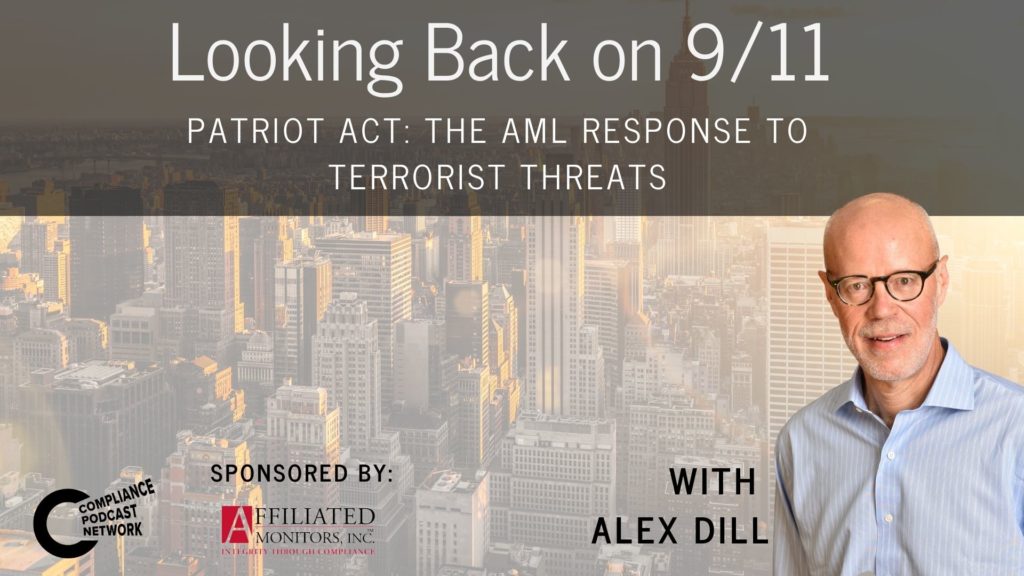
Alex Dill is Tom Fox’s guest on this episode of the Looking Back at 9/11 Series. Alex is a scholar and professor specializing in financial regulation, risk management and compliance. He also has corporate experience in the ethics of business practices in finance, bankruptcy, bond covenants, and debt markets. He joins Tom to talk about The Patriot Act’s impact on responding to terrorist threats.
Listen to the Episode Now:
How 9/11 Changed AML
Before 9/11, AML regulations were very lax and backward looking. The focus was on prosecuting crimes that were already committed, and prosecuting money laundering, more so than the financing of terrorism. Banks weren’t engaging in meaningful customer due diligence as they felt the process invasive. After 9/11, this all changed. Law enforcement agencies and financial institutions revamped their policies and procedures to take a more preventive approach to AML and financing of terrorism. This led to The Patriot Act.
The Financial Response
Tom asks Alex if he saw a similar regulatory response with non-financial institutions with respect to Patriot Act AML procedures post-9/11. “There was a huge amount of rulemaking that had to be done,” Alex responds. He adds that public companies adopted customer due diligence, and that it was applied more broadly to different sectors, but with a risk-based approach. Companies now had to file suspicious activity reports, not just banks. Customer identification was also introduced. “The Patriot Act sought to encourage cooperation among law enforcement agencies, and among the financial institutions themselves to share information and obtain information from foreign law enforcement authorities,” Alex tells Tom.
The Challenge With The Patriot Act
Alex explains to Tom that there are challenges with the Patriot Act. A major challenge is detecting the financing that goes into these attacks. Funds that finance these actions are sourced from both legal and illegal means, and that is a major issue. The transaction amount can be small, and this might pose a risk to some compliance officers.
Technology in Anti-Terrorism
Alex remarks that technology is very important moving forward in the fight against terrorism, as it has changed the way we function in our world. The downside of technology is that it has also helped create some of the compliance issues we have today. Social media platforms have helped to create polarization in the society, and programs like cryptocurrency have been used by criminals for money laundering, and financing terrorism. However, Alex ends with a positive note stating that the AML act of 2020 has been doing the work to help curb these issues.
Resources
Alex Dill | LinkedIn | Twitter





